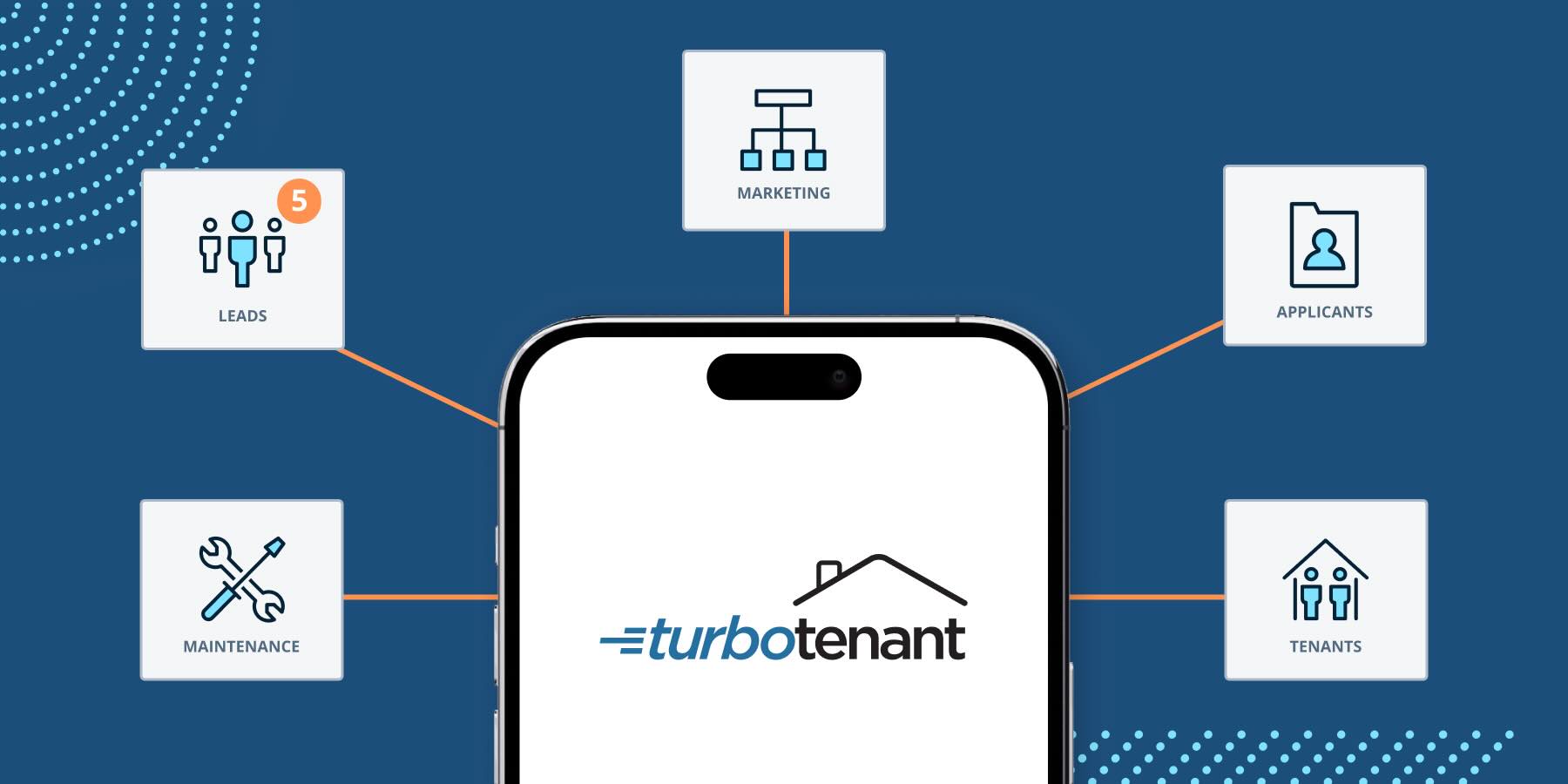9 min read
Stay Compliant with TurboTenant’s AI and State-Specific Leases
Why Lease Compliance Matters for Landlords It goes without saying that a written lease agreement is an essential part of renting to...

“When is rent due?” is one of the most critical questions that small landlords have on their minds when renting out property (followed closely by “When is rent considered late?”).
Rent is the lifeblood of your investment, and setting clear expectations for your tenants about when to pay rent and what happens if they don’t is crucial to ensure timely payments. When you manage up to 10 units, even one tenant behind on a rent payment can have a profound impact on your cash flow and planning, so a clear and detailed explanation in the lease agreement isn’t just a good idea; it’s a necessity.
So when is rent due? In this guide, we’ll explore rent due dates, grace periods (mandatory and self-enforced), the benefits of online rent collection, and some best practices for collecting rent.
Collect rent online and encourage your tenants to make on-time payments with free Rent Reporting by TransUnion.
Collect rent online and encourage your tenants to make on-time payments with free Rent Reporting by TransUnion.
For most landlords, rent is due on the first of the month, a common practice that is consistent across the majority of rentals in the country. While rent doesn’t have to be due on the first of the month, many landlords choose to maintain this date because tenants are accustomed to

it, and it ensures that funds are in the landlord’s account to cover mortgage payments, insurance, or other monthly expenses.
But what happens if your tenant wants to pay rent on a monthly or bi-monthly schedule? Or what if they request another date for other reasons? Since there is no requirement to make any particular day the rent due date, you’re free to work with your tenant to find a date that is most convenient for both parties and that will encourage on-time payments.
List the due date (and information on grace periods and late fees, which we’ll discuss later) in the lease agreement that you and the tenant will sign, taking care that they understand when rent is due and what happens when it’s late.
Many landlords are turning to online tools, such as property management software, to help with automatic reminders and online rent collection, which is a helpful way to collect funds on time. Tenants can use the software to pay you directly, taking the burden of chasing down rent off your shoulders.
Many landlords find that good communication and offering flexible payment options are great ways to keep tenants happy, their units full, and rent consistently rolling in on time.
Now that you’ve found a tenant and negotiated the terms of the lease agreement, when is rent due for the tenant?
Most landlords will collect all of the move-in funds before handing over the keys to the unit, which means either collecting a whole first month’s rent or a prorated rent amount that will cover the rent until the start of the next rental period. Once the lease is signed and the tenant makes their first rent payment and sends their security deposit, the lease is considered fully executed and legally binding.
Speaking of security deposits, it’s important to note that while deposits are often equal to one or two months’ rent, they are not the same as rent payments. Security deposits are secure funds held by the landlord to protect themselves and the property in case of tenant damage or lease violations.
It is often necessary to handle and store the security deposit in a specific way as required by the state’s landlord-tenant laws, and the funds must be returned to the tenant at the end of their tenancy, minus any applicable deductions.
It’s a good idea to provide the tenant with a receipt for both the initial rent payment and the security deposit (and in some states, this is required). This practice helps keep all parties on the same page about what was collected and when.
A grace period (often 3-5 days) is a short window of time between the date that rent is due and the date by which the rent is considered “late.” If the tenant still hasn’t paid the rent amount in full by the end of the grace period, the landlord may choose to charge a late fee or start the eviction process by delivering a notice in accordance with state law.
While not all landlords choose to allow for a grace period, some states require them and have passed laws to that effect. It’s often a matter of personal preference whether a grace period is beneficial for rental properties, with some landlords believing it’s an act of goodwill towards the tenant and helps avoid potential conflict if the tenant mistakenly misses a payment.
However, other landlords believe that the lack of discipline around making an on-time payment can encourage chronically late payments, which can have an impact on your cash flow.
Regardless of the laws in your state or if you choose to offer a grace period, all of that information should be listed in the lease agreement as plainly as possible. Define the date rent is due and the date that rent is considered late, as well as the penalty for a late payment.
You can also include additional language specifically noting the length of the grace period (or the absence of one) to make sure it’s fully clear to the tenant what the expectations and consequences are.

Now that you understand how grace periods work, the question “When is rent considered late?” is probably much easier to answer. Rent is late immediately after the grace period ends.
Several consequences can occur as soon as rent is officially late, including late fees, notices to pay, or even the initial steps of the eviction process.
Late fees: Many states have passed laws that limit or cap the amount that a landlord can charge for late fees on late rent. The lease agreement should clearly state the amount of the fees (either in a dollar amount or percentage of the rent) and when the tenant will start to incur late fees.
Notices: As soon as rent is considered late, communicate with your tenant about the issue. In many places, state law outlines the process for notifying tenants that rent is late and the subsequent steps that landlords may take to address the issue.
Some states enforce a specific “pay-or-quit” timeframe, informing the tenant that they must either pay the remaining rent due or vacate the property. Others allow you to skip the “pay” step and move right to “quit,” and can immediately begin the eviction process.
Eviction: As mentioned above, each state has a different process for initiating an eviction. Check with your local landlord-tenant laws to understand the process. Never attempt to remove a tenant yourself.
Creating and enforcing a solid policy for collecting rent is critical for a positive landlord-tenant relationship. Stay consistent with the policy across all of your properties throughout a tenancy and keep in communication with tenants so you can anticipate issues before they blow up.
| State | Grace Period | Late Fee Limit |
|---|---|---|
| California | None required | Must be “reasonable;” specify terms in the lease |
| Colorado | 7 days after rent is due | $50 or 5% of the overdue rent, whichever is greater |
| Florida | None required | $20 or $20% of the monthly rent, whichever is greater |
| Georgia | None required | No limit; specify terms in the lease |
| Illinois | 5 days after rent is due | $20 or 20% of the monthly rent, whichever is greater; some jurisdictions impose different limits |
| Michigan | None required | No limit; specify terms in the lease |
| New York | 5 days after rent is due | $50 or 5% of the monthly rent, whichever is less |
| North Carolina | 5 days after rent is due | $15 or 5% of the monthly rent, whichever is greater |
| Ohio | None required | No limit; specify terms in the lease |
| Texas | 2 days after rent is due | 12% of the overdue rent for properties with less than four dwelling units; 10% of the overdue rent for properties with more than five dwelling units |
While the lease agreement is the defining document that outlines how a tenancy should operate, states and cities also enact their own landlord-tenant laws to provide a framework for how rentals are managed.
State and local laws always take precedence over lease agreements and must be followed, even when setting rent amounts, applying late fees, or deciding how and when to collect rent. This includes complying with any rent control measures in effect.
Some examples of state-specific laws include:
California: State law does not dictate a specific grace period that landlords must follow but states that all late fees must be “reasonable,” which is usually understood to be around 5-10% of the monthly rent. Additionally, many local governments in California have instituted some version of rent control or rent stabilization.
New York: New York mandates a minimum 5-day grace period before rent can be considered late and caps late fees at $50 or 5% of the monthly rent, whichever is less. New York City has also instituted rent control policies that limit rent increases to 2.75% for many apartments.
Texas: Texas requires at least 2 full days past the rent due date before rent is considered late. Late fees must be “reasonable” and are capped at 12% of the monthly rent for properties containing four or fewer units and 10% of the monthly rent for a house or building with more than four units.
Landlords should always check with local housing authorities to make sure they stay compliant with state and local laws, especially if they’re renting out a property in a new place for the first time. You can also sign up for a TurboTenant account, where we offer landlords legally compliant printable and online lease agreements for all 50 states and Washington, D.C.
You’ll never again have to field a text message from a tenant asking when rent is due if you set up automatic rent reminders using a rent collection tool like TurboTenant. Online rent collection tools allow you to track payments easily and let tenants set up automatic payments directly from the platform.
TurboTenant is also a powerful rental property accounting software that connects directly to your accounts, making it easier than ever to track your cash flow.
Additionally, rent collection tools allow you to create a rent collection calendar or checklist, enabling you to visualize the data and plan for important dates, such as rent due dates and grace periods. The tool will automatically assign the proper late fees the moment rent is officially overdue.
Tools like TurboTenant often offer a tenant portal that lets you post handy information about the unit, including a copy of the lease agreement and other notices, so that everyone stays on the same page. In-platform messaging allows you to stay in touch with your tenants regularly, minimizing the potential for miscommunication and confusion.

“When is rent due?” and “When is rent considered late?” are both questions that appear simple at first glance but can become a little more complicated once state and local laws enter the equation.
Understanding local laws around rent collection is a critical component of being a landlord, and conveying that information to your tenants in an efficient way is just one step in being a successful small landlord. Review your lease agreement regularly to make sure that you’re on top of any changes to the law and communicate those changes to your tenants as they arise.
But you don’t have to do any of this alone. Sign up for a TurboTenant account today to instantly set up automatic rent reminders, gain access to legally compliant lease agreements, and find state-level resources to make being a landlord easy and profitable.
Happy landlording!
If rent is due on the 1st, it’s generally late on the 2nd (unless the lease includes a grace period). Many states require a grace period of a few days, typically 3 to 5 days. After that, landlords can charge a late fee if allowed by law.
Rent is usually due on the day the lease begins, regardless of when the tenant moves in. If the move-in date falls in the middle of the month, the landlord may prorate the rent for the first month. Always check the lease to confirm the exact amount and due date.
A rent due date is the specific day each month when a tenant is required to pay rent, as stated in the lease. Most leases set the due date on the 1st, but it can vary. Paying after this date may result in late fees or penalties.
If rent is due on a weekend or holiday, the lease or state law usually determines whether it’s considered late the next day. Many landlords accept payment the following business day without penalty. Always review the lease and local laws to ensure you are aware of any specific rules or exceptions.
9 min read
Why Lease Compliance Matters for Landlords It goes without saying that a written lease agreement is an essential part of renting to...
13 min read
“When is rent due?” is one of the most critical questions that small landlords have on their minds when renting out property (followed closely...
8 min read
So, you’ve advertised your rental property, secured a tenant, and started a new lease. After conducting tenant screenings and property maintenance, you might imagine...
Join the 750,000+ independent landlords who rely on TurboTenant to create welcoming rental experiences.
No tricks or trials to worry about. So what’s the harm? Try it today!
TurboTenant, Inc., © 2025
Created in Sunny Colorado